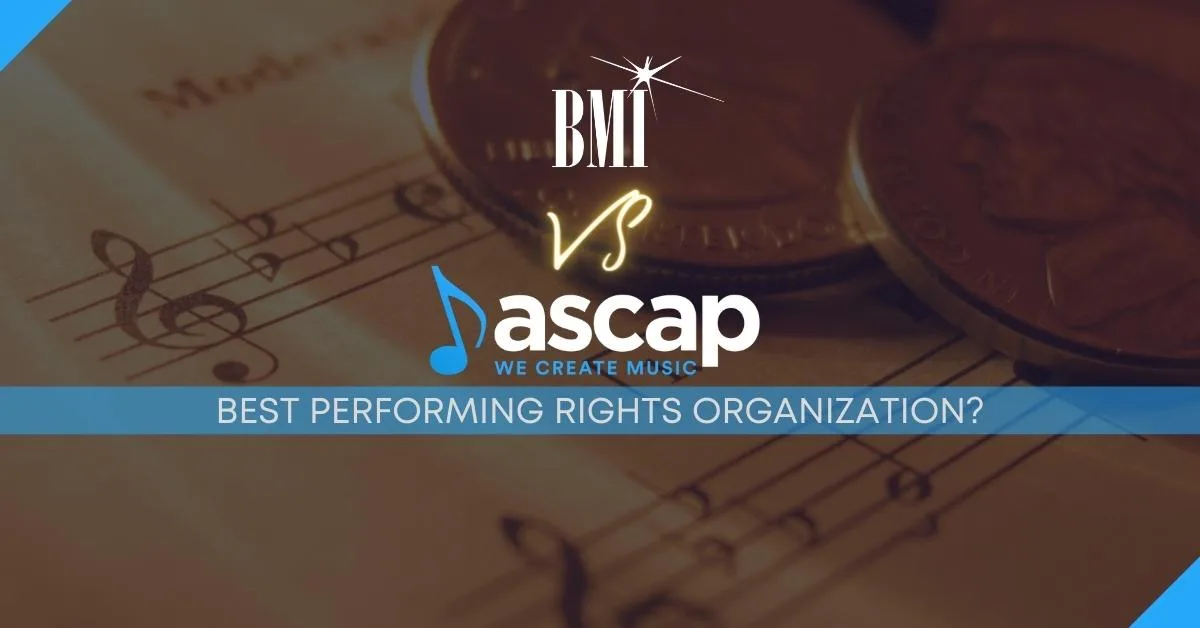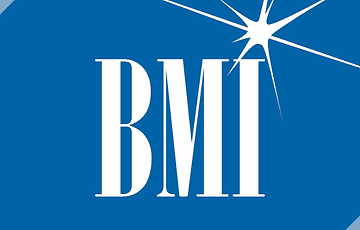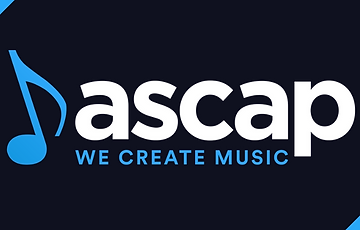
The two main performing rights organizations in the United States are BMI and ASCAP. BMI, which stands for Broadcast Music Incorporated, is a not-for-profit organization representing more than 1.2 million songwriters, composers, and music publishers in all genres of music. ASCAP, the American Society of Composers, Authors, and Publishers, is BMI’s top competitor with over 875,000 members. These two giants do the bulk of royalty collections for the united states music industry.
So, which one of these organizations is the best? And how do they compare to each other? In this article, we will explore the differences between BMI vs ASCAP and try to answer those questions.
- What Is A Performing Rights Organization?
- Who Is BMI? (Broadcast Music, Inc)
- Who Is ASCAP? (American Society Of Composers, Authors, and Publishers)
- Do I Need Both BMI And ASCAP?
- The Battle Of BMI Vs ASCAP
- Why BMI Is A Better Choice Than ASCAP
- Does BMI Copyright Your Music?
- What Is The BMI Registration Process?
- Final Thoughts
What Is A Performing Rights Organization?
A performing rights organization, or PRO, is an organization that represents the interests of songwriters, composers, and music publishers. PROs collect royalties from public performances of copyrighted music and then distribute those royalties to the copyright holders. In the world, there are four main PROs: ASCAP, BMI, SESAC, and SOCAN.
PROs play an important role in the music industry by ensuring that songwriters and composers are compensated for the use of their work. Without PROs, it would be very difficult for artists to make a living off of their music.
If you are a songwriter, composer, or music publisher, you should consider joining a PRO. By doing so, you will ensure that you are compensated whenever your music is performed in public.
Who Is BMI? (Broadcast Music, Inc)

Broadcast Music, Inc. (BMI) is a US-based performing rights organization representing more than 1.2 million songwriters, composers, and music publishers. BMI collects license fees on behalf of its members and distributes them as royalties to those whose works have been performed. They essentially act as the middle man.
BMI was founded in 1939 by a group of radio station executives. The organization was created to provide a more efficient way of licensing the public performance of music. BMI licenses the public performance of music on behalf of its members, ensuring that they are compensated fairly for the use of their work.
BMI is a not-for-profit organization, and all of the fees it collects are distributed to BMI’s members. BMI’s members range from major labels and publishers to independent artists and songwriters.
Who Is ASCAP? (American Society Of Composers, Authors, and Publishers)

ASCAP is a US-based membership association made up of composers, authors, and music publishers. ASCAP stands for the rights of its members by licensing and distributing royalties for the public performance of their work. ASCAP’s mission is to advocate, license, and distribute royalties for the benefit of music creators and the general public.
ASCAP was founded in 1914 by a group of composers including John Philip Sousa, Victor Herbert, and Irving Berlin. ASCAP is the oldest and largest performing rights organization in the United States.
ASCAP licenses the public performances of its members’ work in a variety of ways. For example, ASCAP licenses the right to play music on the radio, in concerts, in bars and restaurants, and on television and the internet.
Do I Need Both BMI And ASCAP?
If you’re a songwriter, music publisher, or business you might be wondering if you need to be a member of both BMI and ASCAP. Both organizations are performing rights organizations (PROs) that collect royalties on behalf of their members. So can you join both? The answer depends on who you are.
Below is a list of scenarios depending on your situation.
Songwriter
As a songwriter, it’s less complicated but harder to decide because you have both options fully at your disposal. Either BMI or ASCAP can suit your needs depending on your goals. We will discuss the differences of BMI vs ASCAP later in this article so you can make an educated decision. Just know one thing, you can only register your songs with one organization and it’s a pain to switch to another down the road.
Business
Businesses may only need a license from one of the two performing rights organizations, depending on the type of music they use and how they use it. For example, a restaurant that plays only music from local bands may only need a BMI license. A radio station that plays mostly pop music may only need an ASCAP license. But, a TV station that airs a mix of music and eclectic programming may need both. As a business, you need to understand the content you are playing and then choose the organization that fits your model.
The Battle Of BMI Vs ASCAP

The BMI vs ASCAP debate has been ongoing for many years. Both organizations have their pros and cons, and it can be hard to decide which one is right for you. Here, we will take a look at some of the key factors you should consider when choosing which organization to represent you.
What Does It Cost To Join?
BMI is 100% free forever and ASCAP has a one-time $50 set-up fee. If you are looking for the cheapest option then BMI is going to be your choice.
Who Pays More?
BMI tends to pay out more for sync licenses if you are a songwriter or publisher. They have a wider reach throughout the world so they can collect more royalties. If you want to make more money then BMI is where it’s at.
Do They Pay Live Performance Royalties?
BMI has “BMI Live” and ASCAP has “ASCAP OnStage” to handle live performance sync license royalties. Both organizations have a section on their websites where users can submit their setlists. The amount paid is based on the license fee paid by the venue. In this category, there is no clear winner.
Who Has The Best Affiliations?
Both organizations have a solid foundation of affiliations but BMI far outshines ASCAP in this category. BMI is affiliated with Billboard, award shows, music festivals, conferences, and musician services like ArtistShare and FanBridge. If you want a well-rounded package of affiliates with your organization then you can’t go wrong with BMI.
Who Gives Back Best To The Music Community?
Both organizations are not-for-profit and invest money back into the music industry in several ways. They both give money to charitable organizations, musician services, and music industry advocacy. We consider this category a tie.
Why BMI Is A Better Choice Than ASCAP
There are several reasons why BMI is a better choice than ASCAP. For one, BMI is free to join as where ASCAP is $50. Second, you can expect to make more money long-term as a BMI member. Lastly, BMI has better affiliations that you can take advantage of with your service.
Additionally, BMI has a more flexible contract structure than ASCAP. This means that you can negotiate a higher percentage of royalties, or you can choose to receive a lower percentage but receive your payments more frequently. BMI also offers a wider variety of payment options, so you can choose the option that best fits your needs.
Overall, BMI is a better choice than ASCAP for most musicians. If you are looking to maximize your earnings potential, BMI is the obvious choice.
Does BMI Copyright Your Music?

BMI and ASCAP DO NOT copyright your music. Copyright is a form of legal protection that gives the author of a creative work the exclusive right to control its use and distribution. BMI only licenses the public performance of music, which is a separate legal right.
Do you need to be a member of BMI to copyright your music? No, membership is not required. You can copyright your music without BMI’s permission or involvement.
Copyrighting is done via the US Copyright Office which is located in the Library of Congress in Washington, DC. If you live far from the DC metro area that is not a problem because you can mail in your paperwork. Just be prepared to wait because on average it takes 3 months to get music copyrighted.
What Is The BMI Registration Process?
The registration process is simple and can be done entirely online. You will need to create an account and then submit your works for registration. Once your works are registered, you will be able to track when and where they are performed, and you will receive royalties for those performances. Did we mention that it’s completely free to join BMI as a songwriter? You can’t beat that!
Final Thoughts
In this article, you have been able to increase your knowledge about BMI and ASCAP. You have learned what they do, what they offer, and which one we think is the best. BMI provides you everything you could possibly want in a PRO and placing your music in their hands is a decision you will not regret.
If this BMI vs ASCAP article has helped in your decision-making, please subscribe to our blog for free music industry advice, tips, and news. Now go make some music, join BMI, and collect some royalties!
“Some of the links within this article are affiliate links. These links are from various companies such as Amazon. This means if you click on any of these links and purchase the item or service, I will receive an affiliate commission. This is at no cost to you and the money gets invested back into Audio Sorcerer LLC.”



